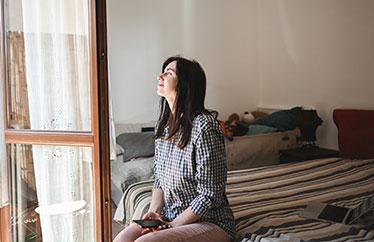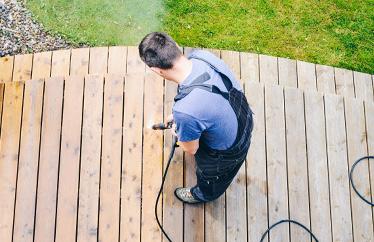Every year, the severity of the wildfire season becomes even more difficult to predict, exacerbated by warmer weather and severe weather patterns. And the predictions for 2021 call for record-breaking temperatures across the nation. If you haven't started already, now is the time to begin actively trying to make your dream home as safe as possible against what may come during wildfire season. Whether it's firescaping your property or completing our checklist below, there is no time like the present.
If you live in an area that’s been affected by a wildfire’s smoke and ash, your best option is to stay indoors and wait out the smoke. If you have moved recently, like many during 2020 and into 2021, get to know your risk. Consult your neighbors, your HOA, Google last year’s wildfire damage for your area, and/or, if possible, speak to the previous owners to learn as much as you can about how to protect your home and it's air quality during wildfire season.
How the affects your health
No matter the size of the wildfire, it's the small particles caused by the smoke and ash that penetrate deep into the lungs. These particles can travel hundreds of miles away from its origin in a matter of hours. This means the effects of the wildfire smoke can be felt beyond those in the direct path of flames. Symptoms of wildfire smoke may include the following:
- Tiredness
- Fast heartbeat
- Chest pain
- An asthma attack
- Coughing
- Stinging eyes
- Runny nose
- Irritated sinuses
- Wheezing and shortness of breath
- Headaches
The best way to protect yourself from wildfire smoke while also preventing the spread of COVID-19 may look a little different this year. Because of this, please see our tips for you and your family during wildfire season amid the aftermath of COVID-19.
Home maintenance
Our Hippo Home Care experts, which provides preventive home maintenance services and advice for homeowners, has a few simple ways to protect your home and keep your family safe indoors:
- Make sure all of your doors and windows have proper weatherstripping with a clean seal when closed tightly. This will help prevent ash and smoke particles from entering your home. Here’s a helpful DIY guide for replacing weatherstripping.
- Consider purchasing a High-Efficiency Particulate Air (HEPA) purifier that is suitable for your home’s size. Air purifiers come in all shapes and sizes. To ensure proper usage, check the square footage of your home and the capacity for a unit.
- Check your home’s HVAC system filter and upgrade it to a minimum MERV 13 rating filter. If upgrading your filter is not an option, keep a closer eye on its condition and change the filter regularly to maintain clean air in your home. Normally you would change your HVAC filter every three to four months. During fire season, your filter may be covered with dust and ash and will look brown to light brown. At this time, it would be best to change out your filter. Along with better air quality, a new air filter will help your system run smoothly, saving you on costly repairs.
- With your home’s exterior properly sealed, it's best not to burn anything inside your home. Try to avoid producing any kind of smoke indoors, including burning candles and firewood. A lack of ventilation could lead to a safety hazard.
- While cooking, check to make sure you’ve opened the vent hood located over your stove to filter out potential gases if your stove is gas-operated.
- Scrub down the outside of your home to remove smoke and ash residue. A power washer will work well to rinse the outside of your home, including all siding, windows, decks, driveways, sidewalks, and other surfaces. External cleaning will help keep the smoke and ash from making its way inside your home.
- If ash or smoke enters your home, make sure to clean all affected clothing and bedding. If smoke has settled on your carpet and furniture, use an at-home carpet cleaner and if the smell is still strong afterward, consider hiring a professional cleaning service.
- Install a smart Smoke/Carbon Monoxide (CO) detector, a smart smoke/CO detector will notify you when you are home or away, allowing you to call the fire department if necessary.
Mask up
If you need to go outside during a time with wildfire smoke in the air, make sure you wear a particulate respirator mask. Although you undoubtedly have a gorgeous wardrobe of masks stocked up from the past year, a cloth face mask will unfortunately not filtering out the small particles of wildfire smoke. The most popular and easy to get (now that we are out of the 2020 shortage) model is the N95, but the P100 model will also work. The N95 is certified by NIOSH and filter out 95% of airborne particles.
While masks are a good option, public health officials still advise that the most effective way to protect yourself from the particles in wildfire smoke is to do your best to stay inside.
The aftermath of wildfire season hits home in a variety of ways. Keeping residual smoke and ash to a minimum can help families stay safe and healthy. Start with these simple home care remedies and for extra peace of mind, other services can track the air quality in your area. One great mobile app we recommend is AirVisual, available for both Android and iOS devices.
If you are already a member of the Hippo family, take advantage of our complimentary Hippo Home Care service and speak to one of our experts for more recommendations to protect your family and your home. Not a Hippo customer yet, give us a call, day or night.




